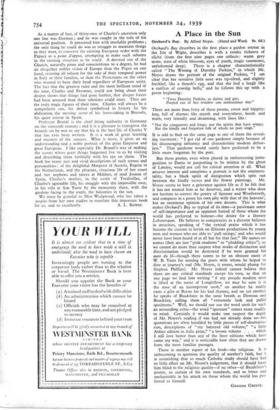A Great European
The Emperor Charles V. By Karl Brandi. Translated by C. V. Wedgwood. (Cape. ors.) THE career and destiny of Charles V exerted a fascination upon the minds of his contemporaries which has not ceased with the passage of time. It may be that it has a greater significance for us in this century than it had for the last,
as, indeed, his ultimate defeat in Germany, and the circum- stances of it suggest reflections very apropos to us at the
present time. His was, I suppose, the most universal secular figure to appear in Europe between Charlemagne and Napoleon. Contemporaries were very conscious of it : Que ya en tierra y en mar no queda parte que no sea trofea de to gloria, wrote the poet Fernando de Herrera. How, indeed, could they fail to be? He was ruler over more than half Europe ; over the Netherlands and Burgundy, Austria, Naples and Sicily, King of Spain and ruler of the vast dominions in the New World, and in Germany Holy Roman Emperor. Nor did this exhaust the sphere of his influence; his marriage policy brought further outlying countries, Portugal, England, Denmark, within the orbit of the Hapsburg family. Tu, felix Austria, nube: the age was astonished by the fortune of the Hapsburgs ; they had almost brought all Europe within their grasp by their dynastic policy, seemed to have restored something of that lost European unity, the shadow of the middle ages, the dream of the best spirits of the humanists of the Renaissance, among them Charles's councillor Erasmus, and his Chancellor Gattinara.
Only one Power remained inflexibly outside the scheme, fought the Hapsburg predominance relentlessly for two genera- tions, collaborated with the Turk in resisting European unity on these terms—France in this age of growing nationalism, conscious of its own power. But it was left to Germany and the German Reformation in the end to defeat their great Emperor and all he stood for.
What a tragic history Germany's has been! Professor Brandi says well :
" Now when she most needed a king who would knit her bound- less power and ambition into one, she found a young ruler who had not one thought in sympathy with her own inner being. His heritage and his duty prepared him to act according to his belief ill a purely dynastic world-Empire, and thus to oppose that ver nation to whose leadership he had been called."
Napoleon thought that he ought to have gone Protestant, and united Germany under that banner. It is ironical to think that Henry VIII, who was a candidate, would have made better German Emperor after all than Charles V.
As a matter of fact, of thirty-two of Charles's ancestors only one line was German ; and he was caught in the toils of his universal position. It presented him with insoluble problems ; the only thing he could do was to struggle to maintain things as they were, to conserve the existing European order with the Papacy as a point d'appui, attempting to make such reforms in the existing structure as he could. A devoted son of the Church, naturally pious and conscientious to a degree, he had an altogether nobler vision of Europe than the Popes on one hand, resisting all reform for the sake of their temporal power in Italy or their families, or than the Protestants on the other who wanted to have their head regardless of European unity. The fact that the greatest ruler and the most brilliant mind of the time, Charles and Erasmus, could not bring about their desires shows that things had gone further, that deeper forces had been aroused than their solutions could meet. They are the truly tragic figures of their time. Charles will always be a sympathetic one, his defeat symbolised in history by his abdication, the moving scene of his leave-taking in Brussels, his quiet retreat in Spain.
Professor Brandi is the chief living authority in Germany on the sixteenth century ; and it is a pleasure to transgress the bounds set by war to say that his is the best life of Charles V that has ever been written. It is a work of great learning and mastery of the sources. What is more, it gives us an understanding and a noble portrait of the great Emperor and great European. I like especially Dr. Brandi's way of making the scenes where great things happened live to us by visiting and describing them faithfully with his eye on them. The book has many just and vivid descriptions of such scenes and personalities: of the delightful Margaret of Austria, Regent in the Netherlands, and the pleasant, vivacious life of her court and her nephews and nieces at Malines, of mad Joanna of Spain, Charles's mother, in the castle of Tordesillas, of Charles's agreeable life, his struggle with the impossible over, in his villa at San Yuste by the monastery there, with the gardens facing to the south, the balconies in the sun.
We must be grateful to Miss Wedgwood, who has taken a respite from her own studies to translate this important book





































 Previous page
Previous page